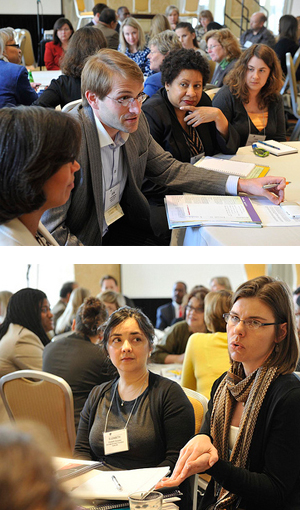Full Circle Dialogues
Monday, April 11, 2011 - 12–1:30 pm
"Full Circle Dialogues" Help Funders Focus on Society's Top Issues
The Council’s many affinity groups contributed mightily to the success of the conference. Attendees could choose to take part in one of a half-dozen "Full Circle Dialogues," which addressed such topics as the arts, education, the environment, health care, families, and the workforce. Several grantmakers’ groups designed these stimulating discussions.
The session on families focused on the role of foundations in creating coordinated responses to address the needs of children and families. Strategies and initiatives to build workers’ skills and meet the needs of local industries and communities were topics of discussion at the workforce session. And an engaged group of funders and others discussed the highly politicized world of education reform.
The session addressed four themes—advocacy, identity, reform, and partnerships—and participants each attended roundtables on two of the topics. In a roundtable on identity, one participant asked whether the root of our squeamishness in discussing race lies in the community or within foundations. Attendees asked some tough questions: Should grantmakers focus on general improvements in education or racially targeted grantmaking and risk creating tension in the community? Does a rising tide lift all boats, or do some boats need extra help? Is college for everyone, or not?
Participants agreed that their efforts largely focused on improving educational opportunities for low-income children, though some said they targeted English-language learners. “We have to be bold and fearless to have uncomfortable conversations,” said one member of the group.
Another offered a key piece of advice: Funders should talk about how their work benefits every student, not all students.
